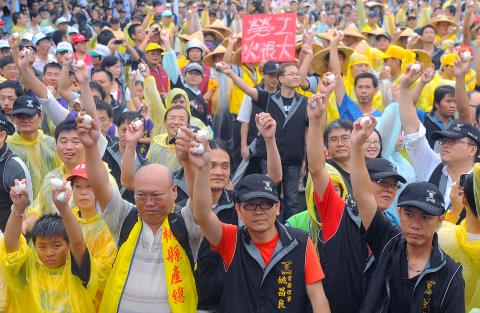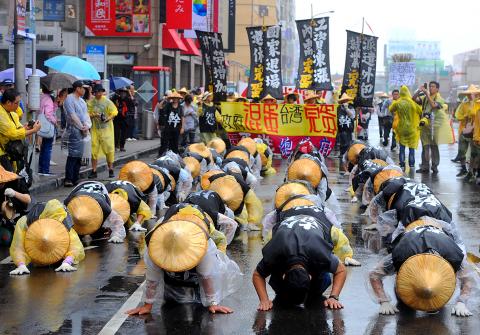Close to 2,000 workers and labor rights advocates yesterday bombarded Ketaglan Boulevard in front of the Presidential Office with eggs while tussling with police as they protested against low wages, unfair labor policies, rising prices and a growing labor insurance deficit.
Despite attempts from the police to calm the crowd, the angry workers — mobilized by various labor organizations, including the Labor Party, Taiwan International Workers’ Association (TIWA), Raged Citizens Act Now and unions from across the country — threw eggs in the direction of the Presidential Office, though they were kept 300m away from the building itself by a line of police.
“Down with the government! Taiwan is finished!” they chanted as they threw eggs across the police line.

Photo Wang Min-wei, Taipei Times
Failing to stop the crowd, hundreds of police officers in riot gear could do nothing but stand behind two large nets and hold their shields high to prevent eggs from hitting them.
Occasionally, officers would advance from behind the police line, trying to arrest protesters who threw more dangerous items, such as smoke bombs, but they were quickly surrounded by the crowd, trying to rescue their fellow protesters, sparking clashes between the two sides.
The demonstration was held in response to several developments affecting labor rights, including the Cabinet’s decision to only partially agree to the Council of Labor Affairs’ proposal to raise the legal minimum wage, the Cabinet’s plan to relax restrictions on hiring foreign laborers and its mulling having separate minimum wages for domestic and foreign workers.

Photo Wang Min-wei, Taipei Times
It also follows the news that the labor insurance system could go broke within two decades and that the government was considering increasing premiums for those who are working, but cutting payments to retired workers.
“President Ma Ying-jeou [馬英九] said that he would work to revive the economy, but when we look at the policies that the government came up with, it’s not hard to realize that they are not working to revive the economy for all, they only work for the benefit of the few,” Taipei City Confederation of Trade Unions secretary-general Chiang Wan-chin (蔣萬金) told the crowd. “They are working for the benefit of big corporations and the wealthy.”
Chiang said that one of the measures that the government was mulling was the relaxation of restrictions on the number of foreign workers that a business may hire.
“This is going to help the big corporations because they can cut costs by hiring more foreign workers and laying off domestic workers,” he said.
TIWA secretary-general Chen Hsiu-lien (陳秀蓮) criticized the government’s proposal to have separate minimum wages for foreign workers and domestic workers.
“If an employer could hire a foreign worker for NT$15,000 a month, why would he or she hire a domestic worker for NT$35,000?” Chen asked.
Chen said that decades ago, big businesses threatened to move their production units overseas unless the government agreed to allow them to import foreign workers, but despite being allowed to hire foreign workers, they still moved their production overseas anyway.
“They are playing the same game again now, we should not be deceived again,” she said.

AGING: As of last month, people aged 65 or older accounted for 20.06 percent of the total population and the number of couples who got married fell by 18,685 from 2024 Taiwan has surpassed South Korea as the country least willing to have children, with an annual crude birthrate of 4.62 per 1,000 people, Ministry of the Interior data showed yesterday. The nation was previously ranked the second-lowest country in terms of total fertility rate, or the average number of children a woman has in her lifetime. However, South Korea’s fertility rate began to recover from 2023, with total fertility rate rising from 0.72 and estimated to reach 0.82 to 0.85 by last year, and the crude birthrate projected at 6.7 per 1,000 people. Japan’s crude birthrate was projected to fall below six,

Conflict with Taiwan could leave China with “massive economic disruption, catastrophic military losses, significant social unrest, and devastating sanctions,” a US think tank said in a report released on Monday. The German Marshall Fund released a report titled If China Attacks Taiwan: The Consequences for China of “Minor Conflict” and “Major War” Scenarios. The report details the “massive” economic, military, social and international costs to China in the event of a minor conflict or major war with Taiwan, estimating that the Chinese People’s Liberation Army (PLA) could sustain losses of more than half of its active-duty ground forces, including 100,000 troops. Understanding Chinese

US President Donald Trump in an interview with the New York Times published on Thursday said that “it’s up to” Chinese President Xi Jinping (習近平) what China does on Taiwan, but that he would be “very unhappy” with a change in the “status quo.” “He [Xi] considers it to be a part of China, and that’s up to him what he’s going to be doing, but I’ve expressed to him that I would be very unhappy if he did that, and I don’t think he’ll do that. I hope he doesn’t do that,” Trump said. Trump made the comments in the context

SELF-DEFENSE: Tokyo has accelerated its spending goal and its defense minister said the nation needs to discuss whether it should develop nuclear-powered submarines China is ramping up objections to what it sees as Japan’s desire to acquire nuclear weapons, despite Tokyo’s longstanding renunciation of such arms, deepening another fissure in the two neighbors’ increasingly tense ties. In what appears to be a concerted effort, China’s foreign and defense ministries issued statements on Thursday condemning alleged remilitarism efforts by Tokyo. The remarks came as two of the country’s top think tanks jointly issued a 29-page report framing actions by “right-wing forces” in Japan as posing a “serious threat” to world peace. While that report did not define “right-wing forces,” the Chinese Ministry of Foreign Affairs was